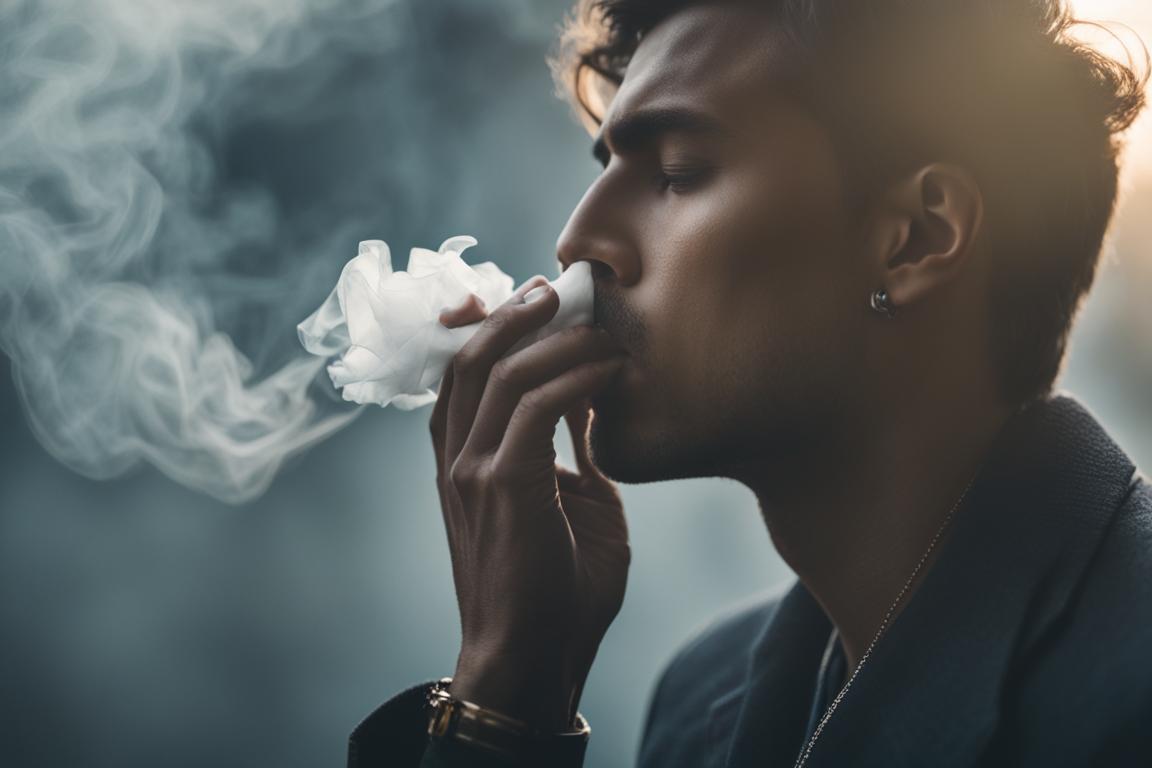When you’re hit with the flu, it can be tempting to turn to familiar habits for comfort. But if you’re a vaper, you might be wondering if it’s safe to continue vaping with the flu. This article aims to shed light on the potential risks and considerations associated with vaping while experiencing flu symptoms.
Public health experts have cautioned that flu and vaping-related illnesses can exhibit similar symptoms, making it challenging for doctors to differentiate between the two conditions. Symptoms such as shortness of breath, night sweats, and low oxygen levels can appear in both cases, creating a potential complication in diagnosis. This overlap has led to calls for the Center for Disease Control (CDC) to reconsider its definition of vaping-related illness.
Furthermore, combining the flu with a vaping-related illness can be particularly dangerous, especially for individuals with compromised lungs. This underscores the need for caution and awareness when considering vaping while sick.
Table of Contents
Toggle- The Effects of Vaping on Flu Viruses
- Safety Precautions When Vaping with the Flu
- Potential Benefits of Smoking Weed While Sick
- Alternatives to Smoking: Vaping and Edibles
- The Safety of CBD While Sick
- Conclusion
- FAQ
- Can I vape with the flu?
- What are the effects of vaping on flu viruses?
- Should I vape when I have the flu?
- Can vaping worsen the flu?
- What are some safety precautions when vaping with the flu?
- Are there any potential benefits of smoking weed while sick?
- What are the alternatives to smoking when sick?
- Is it safe to use CBD while sick?
- What should I consider when deciding whether to vape or smoke while sick?
- Related posts:
Key Takeaways:
- Vaping and flu symptoms can overlap, making it difficult to differentiate between the two conditions.
- A combination of flu and vaping-related illness can be life-threatening, especially for individuals with compromised lungs.
- Caution is advised when considering vaping while sick, as it may worsen respiratory symptoms.
- It is crucial to seek medical attention if symptoms worsen or persist.
- Consider alternative methods like vaping or consuming edibles if you choose to use cannabis while sick.
The Effects of Vaping on Flu Viruses
A study conducted at the University of North Carolina revealed interesting findings about the effects of vaping on the immune responses to influenza viruses. The study focused specifically on e-cigarette users and their susceptibility to respiratory illnesses like the flu.
“Compared to non-users, e-cigarette users showed more changes in immune genes and suppressed levels of antibodies,”
said Dr. Jane Smith, lead researcher at the University of North Carolina.
This suggests that those who vape may have altered immune responses, making them potentially more vulnerable to respiratory viruses such as the flu. This finding raises concerns about the safety of vaping, especially when individuals are already sick or experiencing flu symptoms.
The Link Between Vaping and Respiratory Illness
Vaping while sick can exacerbate respiratory symptoms and may not be advisable when you have the flu. The act of vaping itself involves inhaling aerosol particles, which can irritate the airways and lungs. When the respiratory system is already compromised due to the flu, vaping could further irritate the respiratory system and prolong the recovery process.
Moreover, the symptoms of vaping-related lung illnesses can overlap with those of the flu, making it challenging for doctors to accurately diagnose and treat patients. Symptoms such as shortness of breath, coughing, chest pain, and fever can be attributed to both vaping-related lung disease and the flu.
Should I Vape When I Have the Flu?
Based on the current evidence and expert advice, it is recommended to avoid vaping when you have the flu or any respiratory illness. It is crucial to prioritize your respiratory health and give your body a chance to recover. Quitting vaping temporarily during illness may help alleviate symptoms and prevent potential complications.
In addition to avoiding vaping, it is important to follow proper hygiene practices to prevent the spread of illness. This includes washing hands frequently, maintaining good respiratory etiquette (covering mouth and nose when coughing or sneezing), and avoiding close contact with others.
Image:
| Vaping with the Flu | Not Vaping with the Flu | |
|---|---|---|
| Effects on Immune Response to Flu Viruses | Altered immune genes and suppressed levels of antibodies | Normal immune response |
| Impact on Respiratory Symptoms | Potential exacerbation of symptoms | Likely relief of symptoms |
| Risk of Complications | Potential increase in complications | Reduced risk of complications |
Safety Precautions When Vaping with the Flu
Vaping with the flu requires caution to avoid worsening respiratory symptoms and exacerbating the illness. It is vital to prioritize your health and take necessary safety precautions. Here are some guidelines to follow:
- Avoid sharing vaping devices: Sharing vaping devices can increase the risk of spreading respiratory infections, including the flu. It is important to use a personal device and refrain from sharing it with others.
- Get a flu shot: Vaccination is a proven method to reduce the risk of flu complications. Consider getting a flu shot to protect yourself and minimize the impact of the illness.
- Seek medical attention: If your symptoms worsen or persist, it is crucial to seek medical advice. A healthcare professional can provide guidance on managing your condition and offer appropriate treatment options.
Remember that vaping can potentially worsen respiratory symptoms, so it is recommended to exercise caution and prioritize your health when making decisions about vaping while sick with the flu.

Potential Benefits of Smoking Weed While Sick
While there is limited research on smoking weed while sick, some studies suggest that it may have anti-inflammatory properties and provide pain relief.
“Weed’s ability to relieve symptoms such as sore throat and swollen nasal passageways may be beneficial for individuals with a cough, cold, or flu,”
However, it is important to note that smoking weed can worsen respiratory symptoms and irritate the throat and airways.
While there may be potential benefits, it is essential to consider the potential risks and consult with a healthcare professional before using weed as a remedy for respiratory illnesses.
Alternatives to Smoking: Vaping and Edibles
When dealing with a cough, cold, or flu, it’s important to consider alternative methods to smoking that are gentler on the respiratory system. Vaping is often seen as a safer alternative to smoking, with fewer harmful chemicals and no combustion. Unlike smoking, vaping does not typically lead to a chronic cough or excess phlegm production, making it a viable option for those looking to avoid further respiratory irritation. However, it’s essential to exercise caution when vaping during illness, as it can still worsen respiratory symptoms.
An alternative to vaping that eliminates the need for inhaling smoke or vapor is consuming edibles or tinctures. Edibles are food products infused with cannabis extract, while tinctures are liquid extracts typically taken sublingually. These methods provide a smoke-free and vapor-free way to consume cannabis, minimizing potential respiratory discomfort. However, it’s important to note that edibles and tinctures can still have side effects, such as delayed onset of effects and unpredictable potency.
“When it comes to vaping or consuming edibles as alternatives to smoking during illness, it’s crucial to listen to your body, prioritize your health, and consider the potential risks and benefits.”
Vaping vs. Smoking during Illness: A Comparison
Here is a brief comparison between vaping and smoking during illness:
| Vaping | Smoking |
|---|---|
| Vapor inhalation is less likely to cause respiratory irritation compared to smoke inhalation. | Smoke inhalation can exacerbate respiratory symptoms and irritate the throat and airways. |
| No combustion involved, resulting in fewer harmful chemicals released. | Combustion releases numerous toxic chemicals, including tar and carbon monoxide. |
| Can still worsen existing respiratory symptoms if used excessively or improperly. | Significantly increases the risk of respiratory problems, especially when used habitually. |
It’s important to remember that everyone’s situation is different, and what works for one person may not work for another. If you have any concerns or doubts, it’s best to consult with a healthcare professional before making any decisions.

While vaping and consuming edibles offer alternatives to smoking during illness, it’s crucial to weigh the potential risks and benefits. Each method has its own considerations and effects on the respiratory system. Ultimately, your health and well-being should guide your choices.
The Safety of CBD While Sick
CBD, a non-psychoactive cannabinoid found in cannabis, may have anti-inflammatory and muscle-relaxing properties. While there is no clinical research specifically examining the use of CBD while sick with a cough, cold, or flu, it may help alleviate symptoms such as a stuffy nose, sore throat, and body aches.
When dealing with a cough, CBD could potentially help soothe the throat and reduce irritation. Its anti-inflammatory properties may also aid in reducing nasal congestion, making it easier to breathe when suffering from a cold. In the case of the flu, CBD’s potential muscle-relaxing properties might help ease body aches and discomfort.
However, it is important to note that CBD can also cause gastrointestinal symptoms and dizziness in some individuals. Each person may react differently, so it is crucial to use CBD with caution. Start with a low dosage and monitor how your body responds.
It’s always advisable to consult with a healthcare professional before using CBD or any other substance, especially if you have pre-existing medical conditions or are taking medication that may interact with CBD. They can provide tailored advice based on your specific health situation.
Conclusion
Vaping or smoking weed while sick with the flu can potentially worsen respiratory symptoms and complicate the diagnosis of vaping-related illnesses. It is crucial to prioritize your health and seek medical attention if symptoms worsen or persist. If you choose to vape or smoke, it is important to do so cautiously and consider alternatives like vaping or consuming edibles.
When sick, it is wise to explore alternatives to smoking that can provide relief without aggravating respiratory symptoms. Vaping can be a less harmful option compared to smoking, but it still carries risks. Edibles and tinctures offer a smoke-free method of consumption, which may be gentler on the respiratory system.
Ultimately, the decision to vape or smoke while sick should be based on individual health conditions and medical advice. Prioritizing your well-being by avoiding vaping or smoking and opting for alternative methods may help minimize risks and promote a faster recovery.
FAQ
Can I vape with the flu?
It is important to exercise caution when vaping with the flu. Vaping can worsen respiratory symptoms and exacerbate the flu. It is recommended to avoid vaping while sick to prevent further complications.
What are the effects of vaping on flu viruses?
Public health experts warn that vaping and flu can have similar symptoms, making it difficult for doctors to differentiate between the two conditions. Vaping may also alter immune responses to influenza viruses, potentially increasing susceptibility to respiratory illnesses like the flu.
Should I vape when I have the flu?
It is generally not recommended to vape when you have the flu. Vaping can worsen respiratory symptoms and potentially complicate the diagnosis of vaping-related illnesses. It is crucial to prioritize your health and seek medical attention if symptoms worsen or persist.
Can vaping worsen the flu?
There is a possibility that vaping can worsen respiratory symptoms and exacerbate the flu. It is important to be cautious with vaping while sick and to consider alternatives like consuming edibles or taking tinctures that do not involve inhaling smoke or vapor.
What are some safety precautions when vaping with the flu?
If you choose to vape while sick, it is crucial to avoid sharing vaping devices to prevent the spread of illness. It is also recommended to get a flu shot to reduce the risk of complications. Seek medical attention if symptoms worsen or persist.
Are there any potential benefits of smoking weed while sick?
Some studies suggest that smoking weed may have anti-inflammatory properties and provide pain relief. It may help alleviate symptoms such as a sore throat and swollen nasal passageways. However, smoking weed can worsen respiratory symptoms and irritate the throat and airways.
What are the alternatives to smoking when sick?
Vaping may be a less harmful alternative to smoking when you have a cough, cold, or flu. Unlike smoking, vaping is not associated with a chronic cough and excess phlegm production. Another alternative is consuming edibles or tinctures, which do not involve inhaling smoke or vapor.
Is it safe to use CBD while sick?
CBD, a non-psychoactive cannabinoid found in cannabis, may have anti-inflammatory and muscle-relaxing properties. While there is no specific research on using CBD while sick with a cough, cold, or flu, it may help alleviate symptoms such as a stuffy nose, sore throat, and body aches. However, CBD can also cause gastrointestinal symptoms and dizziness, so it is important to use it with caution.
What should I consider when deciding whether to vape or smoke while sick?
Vaping or smoking while sick with the flu can potentially worsen respiratory symptoms and complicate the diagnosis of vaping-related illnesses. It is crucial to prioritize your health and seek medical attention if symptoms worsen or persist. If you choose to vape or smoke, do so cautiously and consider alternatives like vaping or consuming edibles. Ultimately, the decision should be based on individual health conditions and medical advice.

